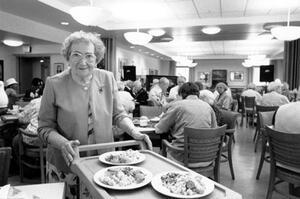Dorothy Wittenberg
A tireless and loyal volunteer for Jewish causes and Sisterhood, Dorothy Wittenberg initiated and has planned, prepared, and served the Ida Weinstein Luncheon at Council House for over 25 years. Born in Denver, Colorado, Dorothy grew up in one of the only Jewish families in Tacoma, Washington. After her father died in 1933 when she was seventeen, she and her mother moved to Richmond, California. They sold retail clothes and cosmetics in an uncle's department store, and Dorothy attended UC Berkeley. In 1948 Dorothy met and married Albert Rosengarten, a jeweler who opened a small business fixing watches in Bremerton, Washington. When her husband died suddenly twelve years later, Dorothy returned to San Francisco. In 1965, she married widower Samuel Wittenberg of Seattle and returned there, becoming his son's stepmother. Though she never had children of her own, Dorothy revels in the role of grandmother and spends her free time baking confectionary masterpieces for her grandchildren and great-grandchildren.
Dorothy talks about her family background and childhood memories. She was born in Denver, Colorado. Her parents emigrated from Russia. Diane's grandfather was a Hebrew teacher and conducted high holiday services. She tells the story of how her parents met, married, eventually moved to Washington. She has lots of fond memories of her grandparents. Dorothy discusses growing up as one of the few Jewish families in Tacoma and describes her Jewish education and family's religious traditions. She recalls instances of veiled antisemitism. Dorothy discusses her father's death and moving to Richmond, California, with her mother at the age of seventeen. Both Dorothy and her mother worked for her uncle's clothing store. Dorothy remarks on her mother's inner strength and nobility in the wake of her father's death. Dorothy attended the University of California, Berkeley, where she joined Phi Sigma Sigma, a Jewish sorority. Dorothy remembers meeting her husband and talks about their courtship, wedding, home, and marriage. She details her motivation for and involvement in volunteer work for various Jewish and charitable organizations. She also comments on the loss of her first husband, their decision not to have children, her second marriage to Samuel Wittenberg, and becoming a stepmother. Dorothy also discusses her need to be part of a Jewish community, Conservative versus Reform Judaism in Seattle, and the changing roles of women in her synagogue. Finally, she reflects on juggling volunteer work with other obligations, her favorite leisure activities, role models, travel experiences, and her grandchildren.



